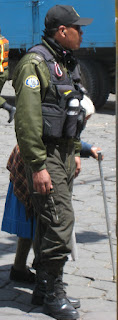
Pitched in the lee of a Black Acacia, the sole piece of vegetation that’s dared to raise it’s crown above donkey graze that’s offered any semblance of shelter all afternoon. We’ve been hammered and grit blasted by a Zonda, a southerly hairdryer wind, that has offered questionable assistance on some of the worst washboard ripio we have ever encountered. Now these acacias down on the pampa are an obnoxious weed, chain sawed mercilessly. Up on the Jujuy Puna they’re shelter and the sole indicator of habitation, as the adobe structures disappear into a background of dust and scrub. With the refuge comes a problem…..thorns. A lance that will pierce even the best of armoured tyres and they will gravitate relentlessly towards any inflatable mats. Yet battered cyclists aren’t the only souls hunting shelter, if the evidence of the churned up sand is to be believed. We might get company tonight.
This poses yet another conundrum. Do we leave the bikes in the ‘kissing’ position, propped together, only to have the wind play havoc and topple them into a tangle? Or to pre-empt the event and place them ‘missionary’, then have a donkey play gooseberry, and become entangled in the spokes?
Zondas usually die out a few hours after sunset, and then the contrast is sublime. Suddenly the landscape is friendly, an utter silence descends, a tangible quiet that’s solidified by a full moon. An altered space that has no place for butt-battering ripio, no hidden pools of impenetrable sand, no salt-laced grit storms, no black thoughts for the integrity of our bikes. All these demons are held at bay, only waiting in a silent truth, waiting the return of sunrise.
Something disturbs my sleep, a slight footfall maybe or just a last shiver of Zonda rustling the leaves. Yet all is now quiet. Then a donkey starts his bray, a whinny that opens with an expectorant of sputum, a smoker’s cough and builds into an eeyore-eeyoring. A doleful, hard-done-to animal that seems to carry all the weight and woes of the world. The call is taken up by the next family group, and passes out and across the land, an echo that has no wall or cliff to bounce off, yet resounds and reverberates, accentuating the silent peace.















